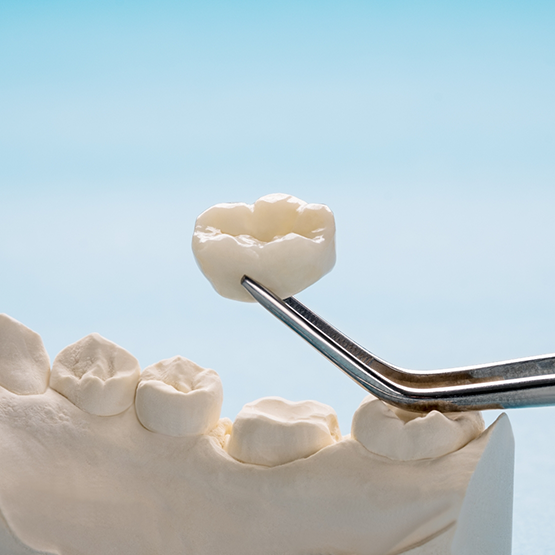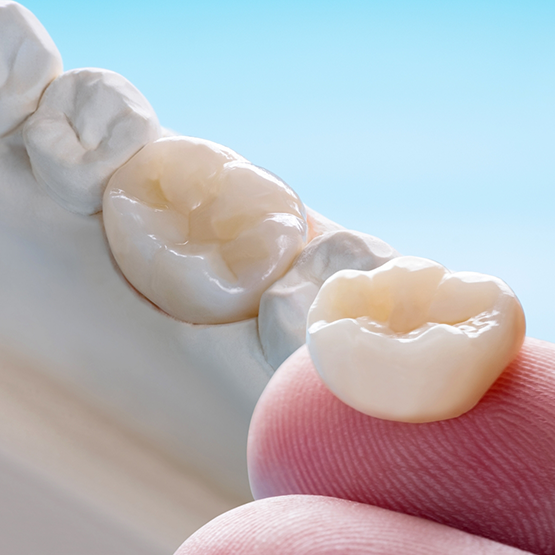Dental Crowns Granby
Give Your Damaged Tooth the Royal Treatment

The crown of your tooth, which is the part that’s visible above your gums, is subjected to an onslaught of attacks every day. From the pressure against other teeth when you chew, to acid attacks from oral bacteria, to protecting the sensitive innermost portions of your tooth, your crown has a tough job. This onslaught of encounters can sometimes compromise the crown. As a result, you may need a dental crown in order to restore your tooth back to normal. Our dentists can give your damaged tooth the royal treatment with a custom-made dental crown. Keep reading below to learn more about dental crowns in Granby and how they can benefit your smile and oral health.
Why Choose Salmon Brook Dental for Dental Crowns?
- Restore Your Tooth Back to Perfection
- Crowns That Can Last 10+ Years
- Late and Saturday Appointments Available
What Are Dental Crowns?

A dental crown is a tooth-shaped restoration that is placed over the crown portion of the compromised tooth, slipping over it like a cap. In the past, crowns were made of durable metals like silver and gold, but these days, we use dental porcelain. This material has an uncanny ability to mimic tooth enamel, even down to the way light bounces off of it. It also offers similar durability to metal crowns without jeopardizing the beauty of your smile.
Do I Need a Dental Crown?

If one of your teeth has weakened to the point that you can barely use it to chew anymore, odds are you might need a dental crown to restore its function. We may also recommend a crown if the tooth has severe decay, a noticeable crack, or some other cosmetic flaw.
Ultimately, the only way to find out whether your tooth could benefit from a crown is to contact us and schedule an appointment.
Benefits of Dental Crowns

Receiving a dental crown comes with a host of benefits. In addition to allowing you to chew with the affected tooth again, the crown applies a gentle pressure against your surrounding teeth to prevent them from shifting around. Each crown is also custom-made to blend in with the rest of your smile, so you can rest assured that onlookers won’t be able to tell it’s not your “real” tooth!
Caring for Your New Dental Crown

Once your crown has been placed, you can treat it virtually the same as you would a normal tooth. That means habits that could harm your natural teeth, like chewing ice, biting your fingernails, or using your teeth to open packaging should be avoided. It’s also imperative that you follow a strict oral hygiene routine of daily brushing and flossing as well as attending dental cleanings at least twice a year. This prevents bacteria buildup underneath your crown that could compromise the restoration.
Dental Crown FAQs
Will my dental crown be noticeable?
At Salmon Brook Dental, we craft our dental crowns out of high-quality dental porcelain. This way, we can restore the function of your smile without taking away from its appearance. Dental porcelain is well-known for how much it resembles tooth enamel, and it’s resistant to stains and damage as well. What’s more, we can even match the shade of your dental crown to the color of your natural teeth. In the end, your dental crown will be practically indistinguishable from the rest of your smile.
Does getting a dental crown hurt?
We need to make sure there’s enough space for your crown to fit comfortably. Oftentimes, this means that we’ll need to remove a small amount of enamel from the weakened or damaged tooth. While this may sound daunting at first, rest assured that you have nothing to worry about. Before reshaping your tooth, we’ll numb the area with a local anesthetic to ensure you remain comfortable all throughout your treatment. There may be some slight tooth sensitivity for a few days after your dental crown is placed, but it should be mild and short-lived.
Can a crowned tooth get a cavity?
While dental crowns themselves are impervious to tooth decay, the weakened teeth they protect are not. Since a dental crown encapsulates the entire visible portion of a tooth, it can help protect it from further damage and decay. However, if plaque and bacteria are allowed to build up on the gums near the rim of the dental crown, they could potentially slip under its edge and attack the vulnerable tooth underneath. Thankfully, you can easily prevent this with great oral hygiene. Be sure to brush your teeth for two minutes twice a day, floss daily with high-quality waxed floss, and rinse with mouthwash regularly.
How long do dental crowns last?
On average, a dental crown will last about 15 years before needing to be replaced. However, bad habits like using tobacco products, neglecting your oral hygiene, and chewing on hard objects can dramatically shorten its lifespan. On the other hand, a few simple precautions can help you make the most out of your newly restored smile, like:
- Thoroughly brushing and flossing your teeth (and dental crown) every day.
- Wearing a custom-made nightguard if you grind your teeth in your sleep.
- Refraining from chewing on hard objects like pen caps, ice, and your fingernails.
- Visiting us twice a year for your routine dental checkups and cleanings.
Remember, teeth can’t heal themselves. If you need a dental crown, it’s best to get one right away to avoid serious future issues and permanent damage. To see if your smile could benefit from a dental crown, give us a call today!
